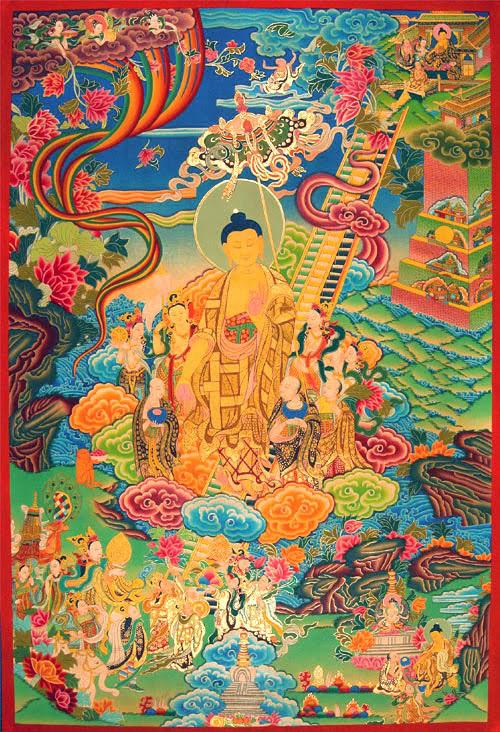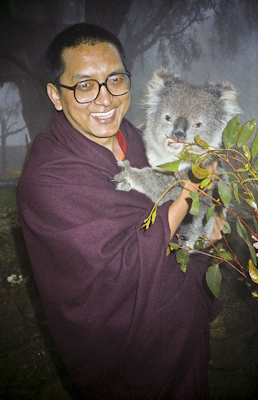Dear Friends,
Happy Lhabab Duchen! Wednesday, October 27, is one of the four great holy days of the Buddhist calendar. It commemorates the day when Guru Shakyamuni Buddha returned to Earth from the God Realm of the Thirty-Three after teaching Dharma for several months to the gods there, including his mother, Mayadevi, who had died a week after Buddha's birth and been reborn there.
As a merit multiplying day, the karmic results of actions done on this day are multiplied one hundred million times, as cited by Lama Zopa Rinpoche from the vinaya text Treasure of Quotations and Logic. You can find specific practices recommended by Lama Zopa Rinpoche for Lhabab Duchen here.
Thanks to your generosity and support we are able to do highly beneficial work here at the Archive such as publishing new books, ebooks and digital titles; posting to our website every month new teachings, videos, podcasts and advices to Lama Zopa Rinpoche’s Online Advice Book; developing our photo archive; sharing Dharma daily with our online communities; and working to preserve our Lamas’ teachings for posterity through uploading everything to our new digital asset management system.
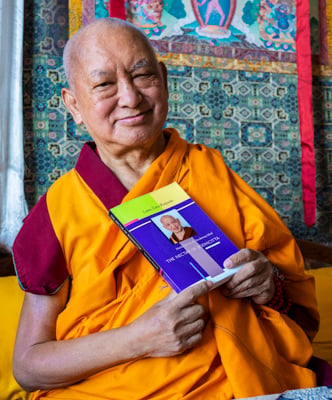 And just in the past year, we have published three new free books! The very popular, Lamrim Year, the essential guide for meditating daily on the lamrim, The Nectar of Bodhicitta, Lama Zopa Rinpoche's teachings on bodhicitta, the mind of enlightenment, and Enjoy Life Liberated from the Inner Prison, Lama Zopa Rinpoche’s advice to prison inmates drawn from more than 100 letters he has written to prisoners over the years. If you haven't ordered your copies, please do so today!
And just in the past year, we have published three new free books! The very popular, Lamrim Year, the essential guide for meditating daily on the lamrim, The Nectar of Bodhicitta, Lama Zopa Rinpoche's teachings on bodhicitta, the mind of enlightenment, and Enjoy Life Liberated from the Inner Prison, Lama Zopa Rinpoche’s advice to prison inmates drawn from more than 100 letters he has written to prisoners over the years. If you haven't ordered your copies, please do so today!
We invite you to continue to partner with us in archiving and disseminating the precious teachings of Lama Yeshe and Lama Zopa Rinpoche. And we rejoice in the activities of all those whose practice and work enables the Dharma to flourish and grow. Take advantage of this meritorious day to make your donation and continue to help us offer essential Dharma teachings to interested students and seekers the world over.
As a token of our appreciation we would like to offer a copy of Big Love: The Life and Teachings of Lama Yeshe with free shipping to anybody who contributes $125 or more at this time. If you already have a copy of Big Love, we can send it to a friend or a Dharma center on your behalf.
FROM THE LYWA VIDEO ARCHIVE: The Life Story of Naropa
This month from the video archive we bring you Lama Zopa Rinpoche telling the life story of Naropa and his guru Tilopa. By telling this story, Rinpoche helps us to feel closer to and inspired by the lineage lamas of the practice of Vajrayogini. These teachings were given by Rinpoche at the Vajrayana Institute in Sydney, Australia, October, 1987.
Visit and subscribe to the LYWA YouTube channel to view dozens more videos freely available from our archive. See also the FPMT YouTube channel for many more videos of Lama Zopa Rinpoche’s teachings.
This month on the LYWA Podcast: The Power of Cherishing Others
The LYWA podcast contains hundreds of hours of audio, each with links to the accompanying lightly edited transcripts. See the LYWA podcast page to search or browse the entire collection by topic or date, and for easy instructions on how to subscribe.
WHAT'S NEW ON OUR WEBSITE
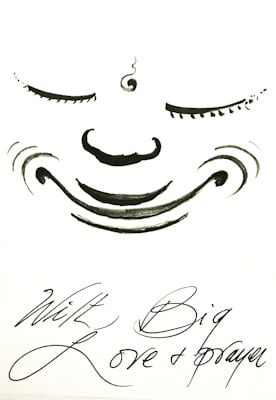 This month in our featured short video from FPMT's Essential Extracts series, Lama Zopa Rinpoche explains that basic Buddhism is about discovering the self and that we live our whole life with the hallucination that the "I" exists from its own side. Rinpoche points out that Buddhism is not just about chanting rituals but for discovering what is true and what is false in your life. This is discovering your self. You can find links to the video here, or visit FPMT’s Essential Extracts webpage to browse the entire collection.
This month in our featured short video from FPMT's Essential Extracts series, Lama Zopa Rinpoche explains that basic Buddhism is about discovering the self and that we live our whole life with the hallucination that the "I" exists from its own side. Rinpoche points out that Buddhism is not just about chanting rituals but for discovering what is true and what is false in your life. This is discovering your self. You can find links to the video here, or visit FPMT’s Essential Extracts webpage to browse the entire collection.
This month we have posted an Errata sheet to the Resources chapter of Big Love: The Life and Teachings of Lama Yeshe. Compiled with thanks to the astute readers who reported errors in the text.
Every month we share new advices for Lama Zopa Rinpoche’s Online Advice Book, adding more than 100 new entries every year on a variety of topics. There are now more than 2,200 of Rinpoche’s precious advices online. Read on to learn what Rinpoche wrote to students at a Dharma center who asked what they could do for the current humanitarian crisis in Afghanistan:
- Prayers for Afghanistan: Students at a Dharma center asked Rinpoche what they could do for the humanitarian crisis in Afghanistan after the fall of Kabul in August 2021, when hundreds of thousands of Afghans were displaced by Taliban militants.
- The Best Time to Practice Dharma: Rinpoche outlined the entire path to enlightenment for a student who asked for direction on their spiritual path. The student had several tattoos of deities and mantras on their body, and Rinpoche also advised what to do about these.
- Excluded from the Center: A student had been asked not to attend a Dharma center, even though they had offered service as a volunteer there. The student felt left out.
- There Are Numberless Buddhas Around Us: Rinpoche sent this letter to a student who wrote that her daughter had become a heroin addict and her son had recently committed suicide. They had both experienced childhood trauma many years ago.
You can always find a list of all the newly posted advices from Lama Zopa Rinpoche on our website.
Please enjoy this month’s teaching, an excerpt from a public talk on the four noble truths given by Lama Yeshe in Melbourne, Australia, 1977. And we hope you’ll make a contribution to support the work we do at LYWA on this meritorious day. Thank you so much!
Big love,

Nick Ribush
Director
THIS MONTH'S TEACHING: Lama Yeshe on True Suffering and Its Cause
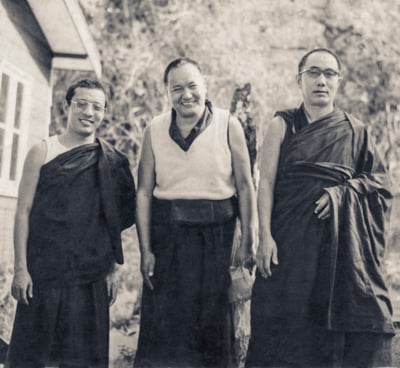 For the most part, we all understand the superficial kinds of suffering such as when someone has a headache or is crying. We say, “Oh, he is suffering so much.” But we are not aware of the true suffering—the disturbances, conflict and dissatisfaction that pervade the mind. It is hard to understand the nature of true suffering.
For the most part, we all understand the superficial kinds of suffering such as when someone has a headache or is crying. We say, “Oh, he is suffering so much.” But we are not aware of the true suffering—the disturbances, conflict and dissatisfaction that pervade the mind. It is hard to understand the nature of true suffering.
Suffering is much more than having a headache or bleeding when one is injured. That kind of suffering is easy to comprehend. The most fundamental kind of suffering is the pervasive dissatisfaction we all experience in our lives. You may be wealthy, beautiful or powerful, it doesn’t matter. Dissatisfaction is still there, all the time, day and night. This is true suffering. It doesn’t matter if you are walking, dancing, laughing or even if you are totally embracing life. As far as suffering is concerned, there are no distinctions among human beings.
The cause of dissatisfaction is a lack of wisdom, not knowing the reality of true suffering. This is the basic human problem. We should reflect on the nature of dissatisfaction and examine what creates the causes of suffering. Many Western people think, “I’m happy! Why should I think about suffering? I don’t want to talk about suffering, dissatisfaction and confusion. I have everything.”
But if you really check up carefully, every one of us is connected with another person, another sentient being. We share this planet with millions of other living beings. And in those relationships with others, we experience confusion and dissatisfaction. We want to be happy, but it is difficult.
It doesn’t matter if you are in a specific relationship with another person or not. Every human being wishes to be happy and not to suffer. This exists equally in all of us. Whether you are a religious person or not, you have some kind of concept, some idealistic idea in your mind of what will make you happy and what will make you unhappy. We all have this idea. Even children have such ideas, even before they can put them into words. These likes and dislikes are intuitive. All human beings are busy trying to solve their problems in order to be satisfied and happy, motivated by an intuitive sense of “I want, I want, I want.”
So the question becomes, what is the solution to this? How to bring about human satisfaction? This is the question. And we really don’t know the answer to this. Instead, we hypnotize ourselves into thinking that no problem exists. But this is totally unrealistic. It is just a mistaken opinion. If you are realistic and thoroughly examine your life—how much satisfaction you actually have in your life—you will come to understand, rather than hypnotizing yourself into believing a mistaken hallucination. If we really check up, we will come to understand that the desire to be happy and to avoid suffering is a basic characteristic of all human beings.
In addition, by not understanding that the root of our confusion and dissatisfaction is not outside of us but is within, that it is a part of our mind, we then make wrong judgments and come to mistaken conclusions. Even if you are not a philosopher, you still have this instinctive philosophy within you. It is important to examine your thinking carefully to detect this kind of mistaken philosophy so that you can correct it, eliminate it; so that you can cut the wrong conception that is the main cause of suffering.
This teaching is excerpted from a public talk on the four noble truths given to more than 300 people at Kew Town Hall, in Melbourne, Australia, July 19, 1977. Edited by Nicholas Ribush from archive #110. Read more about Lama’s 1977 trip to Melbourne in Big Love, pp. 586–90.























